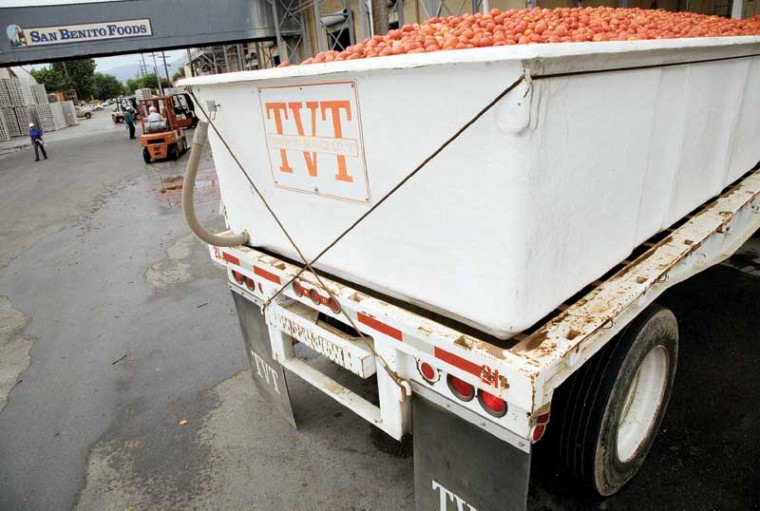Hollister
– The hum beginning Monday along Sally and East streets marked
the start of the tomato canning season, which brings a seasonal
economic boost to San Benito County.
Hollister – The hum beginning Monday along Sally and East streets marked the start of the tomato canning season, which brings a seasonal economic boost to San Benito County.
San Benito County Foods is the only cannery left in the region and has been in Hollister under different names since 1915. Plant management did not return phone calls Wednesday.
Tomato canning season typically brings about 600 extra jobs to the county, said Al Martinez, director of the Economic Development Corp.
The location of the plant in downtown Hollister also has left its mark on the area’s agricultural growth.
Canning tomato production seemed to peak in San Benito County in 1986 – with 5,755 acres dedicated to the crop, totaling almost 200,000 tons worth more than $10 million, according to the San Benito County Agricultural Commissioner’s Office.
The canning season used to run up to five months but in recent years has decreased to three, Martinez said.
“For a long time there was a very heavy inventory of tomato products,” Martinez said. “I don’t know if it was industry-wide, but it was very heavy.”
Local farmers are growing fewer tomatoes, too.
In 2006, the county’s canned tomato crop was a mere 500 acres, producing about 20,000 tons of the fruit worth $1.1 million. In 2005, the county grew 1,000 acres worth $2.6 million.
The price growers fetch for tomatoes has not increased much throughout the years, Matulich said.
“Everything else has gone up four times,” Matulich said. “(Tomatoes) haven’t even doubled.”
Matulich said 2006 marked the smallest acreage he had seen in his 40 years in the county. The commissioner said production has decreased in recent years, but up to 2,000 acres of canning tomatoes are usual in San Benito County.
This year the canning tomato crop should be back to normal, Matulich said.
“I hear there’s going to be a few more acres going,” Matulich said.
Filice Farms expects to grow roughly 250 acres this year, said owner Kay Filice. Filice said her farm’s tomato production has decreased throughout the years due to economic pressures.
Tomatoes remain an important crop for Filice, though. Rotating crops help keep soil free of disease.
“It’s good to have diversity in the numbers of crops we are growing,” Filice said.










